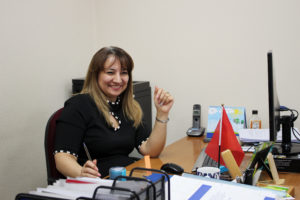 Author: Grana Zia, AFEW-Kyrgyzstan
Author: Grana Zia, AFEW-Kyrgyzstan
The executive director of AFEW-Kyrgyzstan Natalya Shumskaya is talking about the successes and challenges of the organisation in 2018 and the new demands for 2019.
– Natalia, what are the main achievements that AFEW-Kyrgyzstan can be proud of in 2018?
– I am really proud that the World Health Organisation (WHO) recognized the clinical guideline we developed for the management of pregnancy among women who use psychoactive substances as the best practice.
In the women’s colony, where we work in partnership with the Penal Medical Service and the Republican AIDS Centre, we managed to achieve the goal of 90-90-90: 90% of HIV-positive people are aware of their status, 90% of them take antiretroviral (ARV) therapy and reach supressed viral load. This is our common contribution to the fight against the HIV epidemic, and it is very encouraging to see such results.
I am also proud that we have managed to develop guidelines for the effective functioning of the coordination commissions on HIV infection and tuberculosis. Under this guideline, we trained over 100 representatives of regional public health commissions in all regions of Kyrgyzstan. We successfully lobbied for the participation of civil society organisations in these commissions.
Remembering 2018, I should also mention the delegation from Kyrgyzstan at the International AIDS Conference in Amsterdam AIDS 2018. We have been looking for funding for a long time, negotiating with various donors. Here is our result: 16 participants from Kyrgyzstan took part in more than 15 sessions; six delegates from Kyrgyzstan became conference speakers, and five delegates took part in poster presentations. At AIDS 2018, we even organized our own workshop for the countries of the Eastern European and Central Asian (EECA) region on community participation in decision making at all levels. I consider this a success, and, taking into the account the huge amount of work for this case, I call this a great achievement.
I am also proud that in 2018 we were able to agree with AFEW International and UN-Women in Kyrgyzstan on the opening of a rehabilitation centre and a social enterprise. It was a long process of negotiating, but we were able to take this step for the sake of healthy future for our country.
– What were your main challenges in 2018?
– I think that challenges are, first of all, opportunities. For example, in 2018 we planned the opening of a centre for teenagers for the prevention of usage of psychoactive substances. It was important for us that the state also contributed to the opening of this centre. We wanted to emphasize the importance of investing in youth development by the state. Children need our help. Unfortunately, negotiations with the mayor’s office were very long. It took us a very long time to receive a huge amount of necessary permits. We organized meetings, made concessions, but we were rejected. In early 2019, the opportunity arose to open such a centre in partnership with the State Agency for Youth, Physical Culture and Sports under the Government. They gave us a large and warm room in the heart of the city of Bishkek. Starting from March, our centre for teenagers begins its work.
– What are the main goals for AFEW-Kyrgyzstan in 2019?
– First of all, we plan to start our social entrepreneurship. We have already opened a training centre and beauty studio. We plan to train women in difficult life situations and to employ them later to work in the beauty studio. Now the important task is to think about marketing strategy and put everything on a self-sufficiency track. For us, this is a new experience. Now we will master fashionable beauty services, understand all the difficulties of accounting and business.
Another goal is to ensure stable development and financial support of our rehabilitation centre. It is being built now with the support of AFEW International. We want it to be a high-quality, multi-functional, modern and convenient for people who use drugs. We do not accept “semi-results”, and will definitely achieve all the goals.
Of course, 2019 will be for us a year of searching for new directions and programs, and strengthening advocacy activities, especially in the field of budget advocacy from the state. We want to strengthen relations with the donor community, non-governmental organisations and the state.
– Natalia, what do you think distinguishes AFEW-Kyrgyzstan from other non-governmental organisations in Kyrgyzstan?
– I think our strongest point is our employees. Due to the fact that our entire team is people with completely different education and experience, we can work in a very large range of services. Among us there are specialists in the field of HIV, tuberculosis, gender experts, researchers, business consultants. In 2017, for example, we began to develop the direction of helping women in difficult life situations. It was the first experience, but now this direction is very successful: 320 women from various key groups (single mothers, victims of gender-based violence, HIV-positive women) had training on the development of economic independence. Some of them started their business after that, someone has already come to our beauty studio as a master or coach. Without a professional team that is ready for new challenges, we would not have succeeded.



